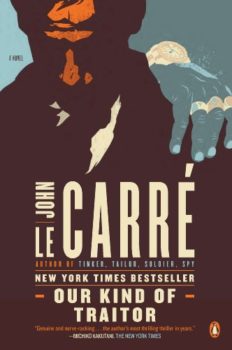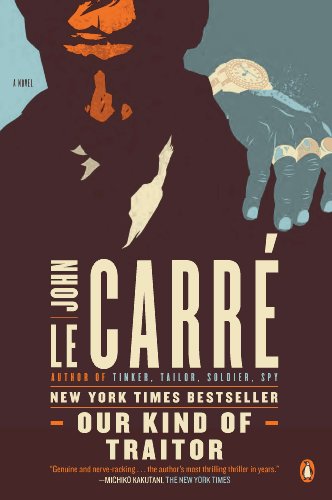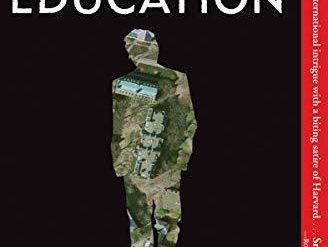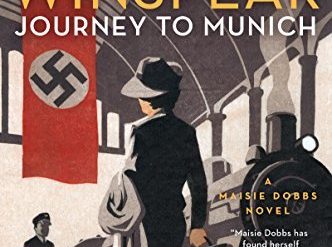
David John Moore Cornwell — the man the world has come to know as John le Carré — was the son of a con man and a mother he met only at age 21. He spent years in the 1950s and 1960s working for MI5 and MI6 in the most difficult years of the Cold War. His frequently troubled life experiences afforded him the real-world experience that lent such authenticity and depth to the Cold War espionage novels he wrote so ably in the decades to come.
Le Carré’s conflicted alter ego, George Smiley, the protagonist of The Spy Who Came in from the Cold (1963) and other early le Carre novels, embodied the inner doubts of that seemingly simpler time that foreshadowed the distrust and insecurities of the 60s and 70s, once we had lost our faith in the institutions that dominated our world.
Our Kind of Traitor by John le Carré ★★★☆☆
When the Berlin Wall fell in 1989, le Carré skillfully adapted, turning to writing about the more complex, multipolar world that has become ever more familiar to us. His field of battle was still espionage. But his subtext, increasingly, was politics–politics on the grand, international scale. Le Carré’s profound distaste for U.S. interventionist policies emerged clearly. Similarly, he showed his hand (most dramatically in The Constant Gardener) for the large, multinational corporations that have come to overshadow the lives we lead. His characters still emerged as fully formed human beings, for the most part. But his writing took on a moralistic tone that some readers found objectionable.
The spy who never left the cold
Le Carré’s latest work, Our Kind of Traitor, bears a stronger thematic resemblance to the Smiley novels than most of his other recent books. The protagonist — a young, unmarried English couple, actually — found themselves mysteriously caught up in a bizarre espionage caper more complex than any George Smiley might have conjured up. The story revolves around a Russian mafia boss (who proudly calls himself the world’s “number one money-launderer”) and the attempts of a renegade in the English secret service to bring him and his family to asylum in Britain.
In the renegade agent’s bruising battles with the powers that be to gain the authority for his plan, and in the doubts and recriminations of the young couple he has dragged into the action, there is much that’s reminiscent of Smiley’s tortured qualms about the moral implications of his work. Four decades later, MI6 is a different beast, of course–a shadow of its former self, sometimes struggling to justify its existence. But Our Kind of Traitor awakens the same sort of moral ambiguity and distrust for authority and convention as did The Spy Who Came in from the Cold.
For additional reading
I’ve reviewed The Spy Who Came In From the Cold and four other spy novels by John le Carré:
- Our Game (British espionage at the end of the Cold War)
- A Legacy of Spies (The Cold War reexamined in John le Carré’s terrific new novel)
- Agent Running in the Field (John le Carré doesn’t like Donald Trump)
- Silverview (A nostalgic look at espionage from John le Carré)
You might also enjoy my posts:
- My 20 favorite espionage novels
- 20 good nonfiction books about espionage
- Top 10 mystery and thriller series
If you enjoy reading history in fictional form, check out 20 most enlightening historical novels. And if you’re looking for exciting historical novels, check out Top 10 historical mysteries and thrillers reviewed here.
And you can always find my most popular reviews, and the most recent ones, plus a guide to this whole site, on the Home Page.


























